For nearly two decades, Jim Killen has served as the science fiction and fantasy book buyer for Barnes & Noble. Every month on Tor.com and the B&N Sci-Fi & Fantasy Blog, Jim shares his curated list of the month’s can’t-miss new SF/F releases.
After Atlas — Emma Newman (November 8, Ace—Paperback)
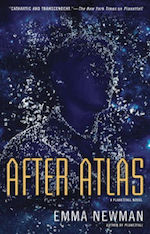 Newman returns to the intriguing world of Planetfall with a second novel (but not a sequel) that is just as thoughtful, lyrical, and moving as the first. When the Atlas left Earth seeking to establish a colony on another planet, it left collateral damage in its wake. Carlos Moreno was a boy who watched his mother leave for the stars, and could do nothing as his father fall into despair and desperation—eventually landing in a religious cult known as The Circle. Forty years later, the leader of The Circle is dead, and Carlos, now a Gov-Corp detective, knows he’s been assigned to the investigation for a reason—but as he looks deeper into the case, he must also delve deep into the past. This is one of the best science fiction novels of the year, a breathtakingly elegant, idea-packed expansion of a rich and fascinating universe.
Newman returns to the intriguing world of Planetfall with a second novel (but not a sequel) that is just as thoughtful, lyrical, and moving as the first. When the Atlas left Earth seeking to establish a colony on another planet, it left collateral damage in its wake. Carlos Moreno was a boy who watched his mother leave for the stars, and could do nothing as his father fall into despair and desperation—eventually landing in a religious cult known as The Circle. Forty years later, the leader of The Circle is dead, and Carlos, now a Gov-Corp detective, knows he’s been assigned to the investigation for a reason—but as he looks deeper into the case, he must also delve deep into the past. This is one of the best science fiction novels of the year, a breathtakingly elegant, idea-packed expansion of a rich and fascinating universe.
Apes and Angels — Ben Bova (November 22, Tor Books—Hardcover)
 When Ben Bova releases a new novel, people pay attention. The conclusion of his Star Quest trilogy finds the crew of the starship Odysseus on a mission to locate planets hosting intelligent life in order to warn them about a wave of deadly gamma radiation spreading out from the center of the galaxy that leaves every planet it passes lifeless and dead. Humanity has managed to safeguard the Earth, and now seeks to protect alien worlds that haven’t reached the same technological level. There are, of course, complications—most notably, the question of whether humans are the first alien species to make contact with the planets they’re seeking to save, and who might have beaten us to the punch. A retro pleasure, Bova’s latest cements his reputation as one of the finest writers of “classic” SF working today.
When Ben Bova releases a new novel, people pay attention. The conclusion of his Star Quest trilogy finds the crew of the starship Odysseus on a mission to locate planets hosting intelligent life in order to warn them about a wave of deadly gamma radiation spreading out from the center of the galaxy that leaves every planet it passes lifeless and dead. Humanity has managed to safeguard the Earth, and now seeks to protect alien worlds that haven’t reached the same technological level. There are, of course, complications—most notably, the question of whether humans are the first alien species to make contact with the planets they’re seeking to save, and who might have beaten us to the punch. A retro pleasure, Bova’s latest cements his reputation as one of the finest writers of “classic” SF working today.
Arcanum Unbounded: The Cosmere Collection — Brandon Sanderson (November 22, Tor Books—Hardcover)
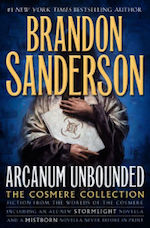 Much more than fan service for readers of his expansive epic fantasies, this collection of short fiction serves to underline the connections between all of the worlds Brandon Sanderson has created, ordering them into a single, unified universe. Along the way, favorite figures from his novels make appearances, including a minor character who might not be so minor after all. These tales aren’t sure belabored exercises in world-building, mind you; they’re rich in action and character, and purposeful in the way they balance the use of magic from story to story. Sanderson has long been considered the gold standard of world-building, and this collection brings that skill to the forefront, revealing unifying elements that will surprise even die-hard fans of his work. It’s a great primer, especially considering we’ll be seeing the Cosmere on the big screen sooner rather than later.
Much more than fan service for readers of his expansive epic fantasies, this collection of short fiction serves to underline the connections between all of the worlds Brandon Sanderson has created, ordering them into a single, unified universe. Along the way, favorite figures from his novels make appearances, including a minor character who might not be so minor after all. These tales aren’t sure belabored exercises in world-building, mind you; they’re rich in action and character, and purposeful in the way they balance the use of magic from story to story. Sanderson has long been considered the gold standard of world-building, and this collection brings that skill to the forefront, revealing unifying elements that will surprise even die-hard fans of his work. It’s a great primer, especially considering we’ll be seeing the Cosmere on the big screen sooner rather than later.
At the Sign of Triumph — David Weber (November 8, Tor Books—Hardcover)
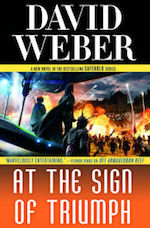 Weber returns to the Safehold universe with a gripping, elegantly plotted new novel that chronicles the epic war between the tiny island realm of Charis and the overwhelmingly powerful Church of God Awaiting. The Church expects to swiftly crush Charis, sending a message to any other potential rebels—but Charis has something more than mere numbers. It has a ruler determined to protect his people, a navy composed of men and women willing to die for the cause, and the knowledge of the lie behind the Church’s founding. There’s also Merlin, the cybernetic avatar of an ancient woman from Earth. After eight years of war, the Church is reeling, and contemplating the unthinkable—an embrace of the forbidden technology that has enabled Charis to survive. The Safehold universe grows ever richer from book-to-book, as Weber operates at the peak of his considerable talents.
Weber returns to the Safehold universe with a gripping, elegantly plotted new novel that chronicles the epic war between the tiny island realm of Charis and the overwhelmingly powerful Church of God Awaiting. The Church expects to swiftly crush Charis, sending a message to any other potential rebels—but Charis has something more than mere numbers. It has a ruler determined to protect his people, a navy composed of men and women willing to die for the cause, and the knowledge of the lie behind the Church’s founding. There’s also Merlin, the cybernetic avatar of an ancient woman from Earth. After eight years of war, the Church is reeling, and contemplating the unthinkable—an embrace of the forbidden technology that has enabled Charis to survive. The Safehold universe grows ever richer from book-to-book, as Weber operates at the peak of his considerable talents.
Culdesac — Robert Repino (November 15, Soho Press—Paperback)
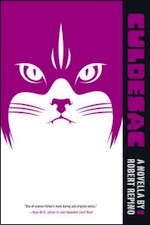 Repino returns to the war-torn world he established in Mort(e) as the War with No Name rages on. The Colony, a race of intelligent ants, has humanity on the run before its army of sentient and intelligent animals. Culdesac, a housecat-turned-general for The Colony, is a brutally effective warrior, for whom violence is always the answer. As his forces occupy the town of Milton, however, he must prepare for a brutal counteroffensive from the humans, even as he discovers secrets that threaten to undermine his understanding of this new universe. Repino imbues a startling sense of realism to a story about an intelligent cat’s desire to wipe out humanity; Culdesac’s story is not only tense and violent, but oddly emotional and touching.
Repino returns to the war-torn world he established in Mort(e) as the War with No Name rages on. The Colony, a race of intelligent ants, has humanity on the run before its army of sentient and intelligent animals. Culdesac, a housecat-turned-general for The Colony, is a brutally effective warrior, for whom violence is always the answer. As his forces occupy the town of Milton, however, he must prepare for a brutal counteroffensive from the humans, even as he discovers secrets that threaten to undermine his understanding of this new universe. Repino imbues a startling sense of realism to a story about an intelligent cat’s desire to wipe out humanity; Culdesac’s story is not only tense and violent, but oddly emotional and touching.
Fireborn — David Dalglish (November 22, Orbit—Paperback)
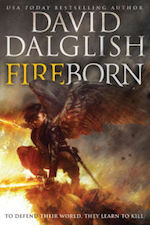 The second installment of Dalglish’s Seraphim series does what second books are supposed to do, deepening its setting in unexpected ways, exploring the characters, and layering on new concepts and ideas. The result is a tense continuation of the story that began in Skyborn. Twins Bree and Kael Skyborn are out of training and working for the rebellion in the war between floating islands in a futuristic and very broken Earth; Bree is famous as the warrior with the unique ability to set her blades flaming, while Kael has become an essential part of the secret rebel cause. As that rebellion inches towards open warfare, the twins begin to uncover the secrets of this broken world, and what lies behind humanity’s unlikely survival.
The second installment of Dalglish’s Seraphim series does what second books are supposed to do, deepening its setting in unexpected ways, exploring the characters, and layering on new concepts and ideas. The result is a tense continuation of the story that began in Skyborn. Twins Bree and Kael Skyborn are out of training and working for the rebellion in the war between floating islands in a futuristic and very broken Earth; Bree is famous as the warrior with the unique ability to set her blades flaming, while Kael has become an essential part of the secret rebel cause. As that rebellion inches towards open warfare, the twins begin to uncover the secrets of this broken world, and what lies behind humanity’s unlikely survival.
Invisible Planets: Contemporary Chinese Science Fiction in Translation — Ken Liu (November 1, Tor Books—Hardcover)
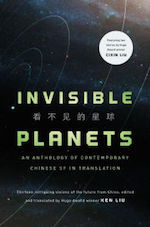 In the year since Cixin Liu’s The Three-Body Problem picked up the Hugo Award for Best Novel, English-speaking readers have enjoyed an influx of SF-in-translation from China. Translator/editor Ken Liu (who has translated two of Cixin Liu’s novels) delivers perhaps the most essential volume yet: a collection of 13 science fiction stories by Chinese writers, along with three perceptive, instructive essays about the significance of SF within Chinese culture. The stories range from award-winning previously translated pieces to Liu’s personal favorites, including recent Hugo winner “Folding Beijing” by Hao Jingfang. In short, these are some of the best stories from a culture many readers will find unfamiliar—and the unfamiliar is what SF is all about.
In the year since Cixin Liu’s The Three-Body Problem picked up the Hugo Award for Best Novel, English-speaking readers have enjoyed an influx of SF-in-translation from China. Translator/editor Ken Liu (who has translated two of Cixin Liu’s novels) delivers perhaps the most essential volume yet: a collection of 13 science fiction stories by Chinese writers, along with three perceptive, instructive essays about the significance of SF within Chinese culture. The stories range from award-winning previously translated pieces to Liu’s personal favorites, including recent Hugo winner “Folding Beijing” by Hao Jingfang. In short, these are some of the best stories from a culture many readers will find unfamiliar—and the unfamiliar is what SF is all about.
Shadow of Victory — David Weber (November 1, Baen—Hardcover)
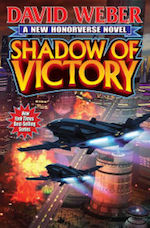 Our second pick from David Weber returns to the Honorverse with a book loaded with reveals, betrayals, and surprises. The Mesan Alignment has been secretly trying to guide evolution to remake humanity according to its own plans. The Star Empire of Manticore stands in the way of this complex conspiracy, forcing the Alignment to engineer not just a war, but an entire campaign of chaos and subterfuge to bring the Star Empire to its knees, an event that could change the Honorverse forever.
Our second pick from David Weber returns to the Honorverse with a book loaded with reveals, betrayals, and surprises. The Mesan Alignment has been secretly trying to guide evolution to remake humanity according to its own plans. The Star Empire of Manticore stands in the way of this complex conspiracy, forcing the Alignment to engineer not just a war, but an entire campaign of chaos and subterfuge to bring the Star Empire to its knees, an event that could change the Honorverse forever.
Shadowed Souls — Jim Butcher and Kerrie L. Hughes (November 1, Roc—Paperback)
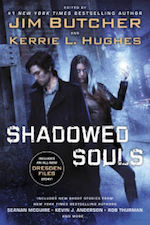 Butcher and Hughes offer up a kickass anthology of urban fantasy featuring some of the best names in the genre. With stories from Butcher, Rob Thurman, Kristine Kathryn Rusch, Tanya Huff, Jim C. Hines, Seanan McGuire, and more, it’s a can’t-lose proposition made even better by the appearance of some of your favorite characters. Butcher’s “Cold Case” opens the anthology in grand style with a momentous case for Lady Molly, a familiar face from The Dresden Files novels; other standouts include stories set in the worlds of Seanan McGuire’s InCryptid series and Tanya Huff’s Vicki Nelson. It’s a must-read collection for any fan of urban fantasy.
Butcher and Hughes offer up a kickass anthology of urban fantasy featuring some of the best names in the genre. With stories from Butcher, Rob Thurman, Kristine Kathryn Rusch, Tanya Huff, Jim C. Hines, Seanan McGuire, and more, it’s a can’t-lose proposition made even better by the appearance of some of your favorite characters. Butcher’s “Cold Case” opens the anthology in grand style with a momentous case for Lady Molly, a familiar face from The Dresden Files novels; other standouts include stories set in the worlds of Seanan McGuire’s InCryptid series and Tanya Huff’s Vicki Nelson. It’s a must-read collection for any fan of urban fantasy.
The Fate of the Tearling — Erika Johansen (November 29, HarperCollins—Hardcover)
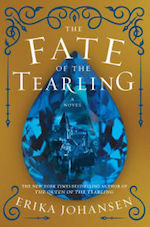 The final book in the Tearling series begins in chaos, as Johansen documents a world struggling to transform itself. Having turned the keys to her kingdom (and her magical sapphires) over to her enemy the Red Queen, Queen Kelsea Glynn continues to experience visions of the world centuries earlier, but struggles to understand how her knowledge of the past can help—or harm—her attempts to hold her homeland. Johansen trilogy-capper builds to a wholly satisfying, bittersweet conclusion.
The final book in the Tearling series begins in chaos, as Johansen documents a world struggling to transform itself. Having turned the keys to her kingdom (and her magical sapphires) over to her enemy the Red Queen, Queen Kelsea Glynn continues to experience visions of the world centuries earlier, but struggles to understand how her knowledge of the past can help—or harm—her attempts to hold her homeland. Johansen trilogy-capper builds to a wholly satisfying, bittersweet conclusion.
The Mad Scientist’s Daughter — Cassandra Rose Clarke (November 8, Saga Press—Hardcover)
 Clarke’s debut novel, originally released in 2013 by Angry Robot, is back in print in a lovely new edition from Saga Press, well-timed to capitalize on our current Westworld obsession. It’s a prescient, compelling story that combines the struggle for equal rights for artificial intelligence with a moving story of romance and regret. Caterina Novak is the daughter of a brilliant roboticist whose life is forever changed when her father brings home Finn, and advanced and lifelike android, to serve as her caretaker. Finn becomes Cat’s friend, tutor, and constant companion—and, eventually, her lover—a problematic development in a world struggling with the question of android rights. Clarke creates a fascinating future world, but never loses sight of her characters, who are fascinating, flawed, and utterly real, none more so than the artificial lifeform at the center of the story.
Clarke’s debut novel, originally released in 2013 by Angry Robot, is back in print in a lovely new edition from Saga Press, well-timed to capitalize on our current Westworld obsession. It’s a prescient, compelling story that combines the struggle for equal rights for artificial intelligence with a moving story of romance and regret. Caterina Novak is the daughter of a brilliant roboticist whose life is forever changed when her father brings home Finn, and advanced and lifelike android, to serve as her caretaker. Finn becomes Cat’s friend, tutor, and constant companion—and, eventually, her lover—a problematic development in a world struggling with the question of android rights. Clarke creates a fascinating future world, but never loses sight of her characters, who are fascinating, flawed, and utterly real, none more so than the artificial lifeform at the center of the story.
The Operative — Gerald Brandt (November 1, DAW—Hardcover)
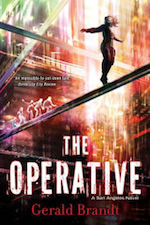 Brandt’s supercharged sequel to The Courier continues the cyberpunk fun of the San Angeles series. Having survived the worst delivery of her life, megacity courier Kris Merrill has been training with the resistance, learning the skills she’ll need to be an Operator like Ian Miller, the man who helped keep her alive. Just as her training is ending, the resistance compound is attacked, and Kris and her fellow trainees are thrust into the fight, ready or not. When Ian is captured, Kris makes it her mission to rescue him, encountering unexpected twists and unexpected allies along the way. Brandt fleshes out an all-too-possible future of crushing poverty and corporate control, and the complex heroine who will lead us through to a better future.
Brandt’s supercharged sequel to The Courier continues the cyberpunk fun of the San Angeles series. Having survived the worst delivery of her life, megacity courier Kris Merrill has been training with the resistance, learning the skills she’ll need to be an Operator like Ian Miller, the man who helped keep her alive. Just as her training is ending, the resistance compound is attacked, and Kris and her fellow trainees are thrust into the fight, ready or not. When Ian is captured, Kris makes it her mission to rescue him, encountering unexpected twists and unexpected allies along the way. Brandt fleshes out an all-too-possible future of crushing poverty and corporate control, and the complex heroine who will lead us through to a better future.
The Operator — Kim Harrison (November 22, Pocket Books—Hardcover)
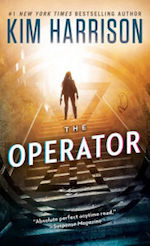 The intense sequel to The Drafter finds former Opti operative Peri Reed in dire straits. Broken by betrayal and the mental damage she suffered by traveling back in time to rewrite short intervals of time and then reintegrate her mind into the new reality, Reed is on the run and coping with a fragmented memory and shattered personality. A highly addictive substance offers some respite, forcing her to choose between returning to her life as a powerful puppet working for an organization she can’t trust, or living at the mercy of whoever happens to offer her illicit access to the drug. Harrison delivers another thrilling adventure in a future where nothing can be trusted and reality itself can shift under your feet.
The intense sequel to The Drafter finds former Opti operative Peri Reed in dire straits. Broken by betrayal and the mental damage she suffered by traveling back in time to rewrite short intervals of time and then reintegrate her mind into the new reality, Reed is on the run and coping with a fragmented memory and shattered personality. A highly addictive substance offers some respite, forcing her to choose between returning to her life as a powerful puppet working for an organization she can’t trust, or living at the mercy of whoever happens to offer her illicit access to the drug. Harrison delivers another thrilling adventure in a future where nothing can be trusted and reality itself can shift under your feet.
The Shadow of What Was Lost — James Islington (November 8, Orbit—Hardcover)
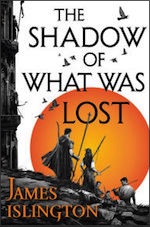 The Shadow of What Was Lost feels old-fashioned in the best of ways, molding familiar genre traditions into something wholly unique. In a world where the magical class has been overthrown, hunted, and subjugated, the struggle cannot simply be divided between magic and mundane or human and divine. The evil that encroaches Andarra, the center of the action, is neither simple, singly focused, or, for that matter, definitively evil. It’s been 20 years since the Unseen War, which overthrew the Augurs, powerful and portentous demigods. Those who once feared and obeyed the them rose up, wiping out the leaders and binding those with lesser magical abilities, the Gifted, to Four Tenets that restrict the use of their powers. Davian, a student of the Gifted, struggles to wield Essence, the magic that should sustain and flow through him with ease, but can “read” people to determine whether they’re telling the truth, a power that once belonged only to the Augurs. That’s a dangerous association for one raised in a world endlessly suspicious of those with abilities outside the norm. But as forces long thought defeated descend from the North, Devian’s quest to understand who he is and what he can do takes on greater urgency than he can comprehend.
The Shadow of What Was Lost feels old-fashioned in the best of ways, molding familiar genre traditions into something wholly unique. In a world where the magical class has been overthrown, hunted, and subjugated, the struggle cannot simply be divided between magic and mundane or human and divine. The evil that encroaches Andarra, the center of the action, is neither simple, singly focused, or, for that matter, definitively evil. It’s been 20 years since the Unseen War, which overthrew the Augurs, powerful and portentous demigods. Those who once feared and obeyed the them rose up, wiping out the leaders and binding those with lesser magical abilities, the Gifted, to Four Tenets that restrict the use of their powers. Davian, a student of the Gifted, struggles to wield Essence, the magic that should sustain and flow through him with ease, but can “read” people to determine whether they’re telling the truth, a power that once belonged only to the Augurs. That’s a dangerous association for one raised in a world endlessly suspicious of those with abilities outside the norm. But as forces long thought defeated descend from the North, Devian’s quest to understand who he is and what he can do takes on greater urgency than he can comprehend.
The Traitor Baru Cormorant — Seth Dickinson (November 29, Tor Books—Paperback)
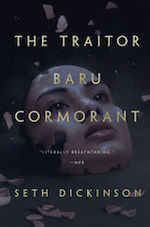 One of 2015’s standout fantasy debuts is now in paperback. Baru Cormorant hates the Empire of Falcrest for what it did to her family and her people when she was just a girl: arriving in force upon the shores of their small island, taking control, absorbing her people and erasing the markers of cultural identity deemed “unhygenic” by imperial science. Luckily, Baru is a prodigy when it comes to revenge. To destroy the empire, she must become a part of it, win its trust, and earn a seat at its heart, where she can strike a killing blow. After one book, Seth Dickinson has joined the ranks of the great evil geniuses of speculative fiction, authors able to make you care immensely for incredibly realized, complex, flawed, frustrating, fascinating characters, then to repay your indulgence by doing terrible things to them. But when the book is this well-constructed—wound tight as a watch, the plot ticking along with the intricacy and inevitability of a sweeping second hand—the result is worth the torment.
One of 2015’s standout fantasy debuts is now in paperback. Baru Cormorant hates the Empire of Falcrest for what it did to her family and her people when she was just a girl: arriving in force upon the shores of their small island, taking control, absorbing her people and erasing the markers of cultural identity deemed “unhygenic” by imperial science. Luckily, Baru is a prodigy when it comes to revenge. To destroy the empire, she must become a part of it, win its trust, and earn a seat at its heart, where she can strike a killing blow. After one book, Seth Dickinson has joined the ranks of the great evil geniuses of speculative fiction, authors able to make you care immensely for incredibly realized, complex, flawed, frustrating, fascinating characters, then to repay your indulgence by doing terrible things to them. But when the book is this well-constructed—wound tight as a watch, the plot ticking along with the intricacy and inevitability of a sweeping second hand—the result is worth the torment.
To Green Angel Tower — Tad Williams (November 1, DAW—Paperback)
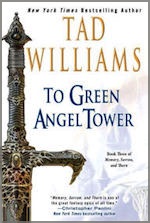 This reissued third volume in the Memory, Sorrow, and Thorn series, which George R.R. Martin has credited in part for inspiring A Song of Ice and Fire, serves as a great reminder why this trilogy was so influential in the first place. Newly available in a single trade paperback (the mass market version was famously split into two books due to size restrictions), the rerelease of this final volume offers a great opportunity to rediscover a trilogy that came to define the modern epic fantasy, in which the lines between hero and villain are blurry, and morality exists in shades of grey. The first two books, The Dragonbone Chair and Stone of Farewell, were released earlier this year; a sequel, The Heart of What was Lost, publishes in January.
This reissued third volume in the Memory, Sorrow, and Thorn series, which George R.R. Martin has credited in part for inspiring A Song of Ice and Fire, serves as a great reminder why this trilogy was so influential in the first place. Newly available in a single trade paperback (the mass market version was famously split into two books due to size restrictions), the rerelease of this final volume offers a great opportunity to rediscover a trilogy that came to define the modern epic fantasy, in which the lines between hero and villain are blurry, and morality exists in shades of grey. The first two books, The Dragonbone Chair and Stone of Farewell, were released earlier this year; a sequel, The Heart of What was Lost, publishes in January.
What the #@&% Is That? The Saga Anthology of the Monstrous and the Macabre — John Joseph Adams and Douglas Cohen (November 1, Saga Press—Paperback)
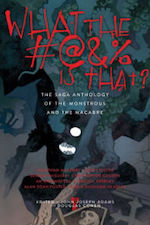 This particularly clever horror collection pivots on a shared line of dialogue—the anthology’s title, with the grawlix replaced by a four-letter curse word of the author’s choosing, appears in every story. With contributions from Seanan McGuire, Laird Barron, and John Langan, among dozens of others, the admittedly off-the-wall setup results in a collection of tales that are clever, chilling, and #@&%ing weird, starting from the dedication page (“For Cthulhu”) on.
This particularly clever horror collection pivots on a shared line of dialogue—the anthology’s title, with the grawlix replaced by a four-letter curse word of the author’s choosing, appears in every story. With contributions from Seanan McGuire, Laird Barron, and John Langan, among dozens of others, the admittedly off-the-wall setup results in a collection of tales that are clever, chilling, and #@&%ing weird, starting from the dedication page (“For Cthulhu”) on.
Binary Storm — Christopher Hinz (November 1, Angry Robot—Paperback)
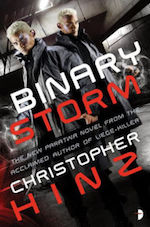 Hinz’s new novel is a prequel to his 1987 work Liege-Killer, but also serves as an excellent standalone novel. In the future, Earth has been devastated by environmental disaster and the scourge of runaway technology, chiefly the Binaries, assassins genetically engineered to be a single consciousness sharing two physical bodies. Binaries are controlled by an “alpha breed” called the Royal Caste, and opposed by a combat team assembled by programmer Nick Smith and Annabel Bakana, the leader of E-Tech, an organization dedicated to eliminating runaway technology that threatens human survival. The leader of the Binary-hunting team, however, is an agent of chaos, obsessed with Annabel, whose rash actions might just give the Royal Caste the upper hand in the war. This is a fast-paced future thriller that delivers on the promise of its high-concept premise.
Hinz’s new novel is a prequel to his 1987 work Liege-Killer, but also serves as an excellent standalone novel. In the future, Earth has been devastated by environmental disaster and the scourge of runaway technology, chiefly the Binaries, assassins genetically engineered to be a single consciousness sharing two physical bodies. Binaries are controlled by an “alpha breed” called the Royal Caste, and opposed by a combat team assembled by programmer Nick Smith and Annabel Bakana, the leader of E-Tech, an organization dedicated to eliminating runaway technology that threatens human survival. The leader of the Binary-hunting team, however, is an agent of chaos, obsessed with Annabel, whose rash actions might just give the Royal Caste the upper hand in the war. This is a fast-paced future thriller that delivers on the promise of its high-concept premise.
This post was published simultaneously on the B&N Sci-fi and Fantasy Blog.










